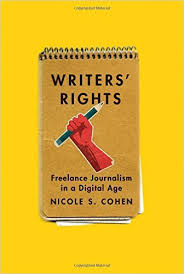In Writer’s Rights: Freelance Journalism in a Digital Age, Nicole S. Cohen offers a new study of the working conditions of freelance writers in English-speaking Canada, the USA and the UK in an age of digital journalism. This is a lucid, informative and passionate defence of the central role that journalists continue to play in enriching democratic debate and a valuable addition to the literature on self-employment more broadly, writes Paul Webb.
Writers’ Rights: Freelance Journalism in a Digital Age. Nicole S. Cohen. McGill-Queen’s University Press. 2016.
 At a time when, to quote Dr Rasmus Kleis Nielsen of the Reuters Institute for the Study of Journalism, ‘literally tens of thousands of journalists are losing their jobs’ and freelancing is becoming a permanent way of working for many creative workers, the publication of Writers’ Rights: Freelance Journalism in a Digital Age could not be timelier.
At a time when, to quote Dr Rasmus Kleis Nielsen of the Reuters Institute for the Study of Journalism, ‘literally tens of thousands of journalists are losing their jobs’ and freelancing is becoming a permanent way of working for many creative workers, the publication of Writers’ Rights: Freelance Journalism in a Digital Age could not be timelier.
Writers’ Rights is a ‘study of the working conditions of freelance journalists’ in English-speaking Canada, the USA and the UK, an account of the context in which freelance journalists work and an assessment of the organisational strategies which they have used to deal with their economic circumstances and powerlessness vis-à-vis publishers (6). Under the term ‘freelance journalist’, Cohen – a former one herself – includes reporters as well as producers of non-fiction of all types, including features and corporate material. The study is based on the author’s own online survey of 206 Canadian freelance journalists in 2010, semi-structured interviews with staff and organisers within journalistic organisations and an interdisciplinary literature review (19-20).
Cohen begins by describing the working conditions of freelance journalists, which have deteriorated markedly with the arrival of digital journalism. Although one could argue that journalists are now living in a ‘golden age’ because of the explosion of online publications, Cohen provides a convincing exposé of worsening working conditions, including low or non-existent fees relative to colleagues on permanent contracts, inconsistent payment schedules, exclusion from social benefits due to the self-employed status of the freelance worker and the aggressive pursuit of copyright by publishers that leads to writers surrendering their ‘moral right’ to be recognised as the author of a work via a byline.
In short, it is becoming very difficult to earn a living as a freelance journalist. Indeed, other sources would seem to corroborate Cohen’s assessment. As a recent survey for the National Council for the Training of Journalists (NCTJ) shows, the mean salary of freelance journalists in the UK is £19,499 per annum (5), with 44 per cent reporting that they earn less than £15,000 per year (6).
 Image Credit: (Mark Bonica CC BY 2.0)
Image Credit: (Mark Bonica CC BY 2.0)
But why should the comparative immiseration of freelance journalists matter? For Cohen, it matters because the way in which freelance journalists are paid influences the types of journalism that are produced. Where freelance journalists are paid by the word, per feature or work on a pro bono basis in order to establish their brand, investigative journalism, freelance war reporting or in-depth feature writing become prohibitively expensive. A recent survey by Project Word of freelance investigative reporters hammers the point home by reporting that 55 per cent of survey respondents ‘failed to recoup their expenditures from story revenue, grants, or donations’ (5). Cohen is therefore correct to argue that ‘journalism is a form of communication essential for meaningful participation in democratic life’ (7), and that its viability as a practice is being seriously compromised by the ways in which journalists are remunerated for their work.
Cohen is also persuasive when describing how falling payments for freelance work can lead to the fusion of work and leisure time as writers strive to maximise every hour of the day to create value (128). The representation of the journalist as a worker who is always tuned in to the possibility of a saleable story may be an ideal type – if of the negative variety. By contrast, the NCTJ survey shows that 43 per cent of respondents were working part time and 87 per cent thought that their hours were reasonable (5). The NCTJ survey respondents also didn’t tend to view their freelance status as an unwanted interlude between one permanent contract and another, with 82 per cent reporting that they were not seeking to leave freelance journalism (6). However, apparently contradictory survey results from other sources do not necessarily invalidate Cohen’s assessment of the economic plight of freelance journalists. As she herself acknowledges, freelance journalists can be characterised by variation in terms of their earnings, working experiences and levels of job satisfaction (15).
Cohen’s account of what it is like to be a freelance journalist is understandably influenced by the concepts she uses, which are drawn from Marxist political economy. Although she recognises that many freelance journalists conceive of themselves as entrepreneurs, she argues that they do not, in most cases, accumulate capital or own the means of production which are vital ‘in order to bring products to market’ (26). For Cohen, journalists occupy a contradictory class location between the working class and the petty bourgeoisie at the economic level and between the working class and the bourgeoisie at the intellectual level (35). In other words, many freelance journalists may endure penury, but identify with the objectives of the publisher.
Rather unsurprisingly, therefore, the book concludes by making the argument that freelance journalists can improve their economic situation by mass unionisation. In order to buttress her argument, Cohen refers to the Canadian experience, which shows that writers’ organisations can make tangible gains for their members. She therefore references a number of organisations including a literary agency (the Canadian Writers Group), a professional association (the Professional Writers Association of Canada) and a union (the Canadian Media Guild) that have indeed secured improvements for their members. The collective agreements that the Canadian Media Guild have secured with a range of employers is one noteworthy example as is their affiliation with the 700,000 member strong Communication Workers of America.
However, what is clear is that attempts by freelance journalists to organise collectively have been hampered by the sheer number of writers’ organisations. Cohen recognises this by identifying the different attitudes that freelance journalists have towards collective organisation. Should a writers’ organisation be a professional association offering services to its members like a mutual society? Or should it be a literary agency representing the most prominent writers? Or should the organisation be a union and engage in collective bargaining on behalf of a mass membership base? Cohen plumps for the latter option (230-31). Although she is correct to suggest that creating a large union might be possible, I’m less convinced that an organisation of this type would survive in the medium to long term for the reasons Cohen herself recognises: freelance journalists are a diverse group with differing aspirations and ideological positions that are not necessarily compatible. How, for example, could a union hold together a membership that includes journalists who identify as small business people and writers who think of themselves as creative workers with an affiliation to the labour movement? Yes, one could argue that the entrepreneurial language that some journalists use masks the reality of the power imbalance between freelance journalists and publishers, but the fact that some journalists regard themselves as entrepreneurs must surely influence the types of collective organisations that they join.
Although I’m less optimistic than Cohen about the possibilities for organising such a diverse range of creative workers within a super union, Writers’ Rights is an invaluable addition to the literature on self-employment in general and freelance journalism in particular. Lucid, informative and passionate in arguing that freelance journalists can both defend their profession and produce journalism which enriches the democratic debate, this book will be read by practising journalists and students of the media alike.
This review originally appeared at the LSE Review of Books.
Please read our comments policy before commenting.
Note: This article gives the views of the authors, and not the position of USAPP– American Politics and Policy, nor of the London School of Economics.
Shortened URL for this post: http://bit.ly/2nOluzY
——————————————–
Paul Webb
Paul Webb is a Research Manager at Praxis Care, Belfast, Northern Ireland. Read more by Paul Webb.






